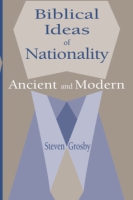Biblical Ideas of Nationality, Ancient and Modern
Steven Grosby
In this collection of essays, drawn from more than a decade of study and publication, Steven Grosby investigates ancient texts (biblical and other) from within a methodology that is founded on philosophical anthropology. His goal is to examine the ways in which the ancients defined themselves, particularly in terms of kinship, territoriality, and boundaries, and how these relate to concepts of nationality. Grosby denies that modern historicists have it right when they claim that only imprecise frontiers existed in antiquity, or that nationality is a primarily modern concept. Instead, despite differences between our times and ancient times, he believes that significant similarities permit the application of anthropological theory to the study of the self-perception of ancient peoples. In this respect, his researches break new ground. But Grosby is not content with an analysis of the past. He goes on to draw implications from it with regard to modern issues related to nationalism. Thus, he writes,
- Description
- Table of Contents
“Moreover, if we learn anything from the experience of the bellicose twentieth century, it is that we, in fact, live primarily in monolatrous societies; that modern man attributes a common kinship to those who, like himself, are born in the territory in which he was born and inhabits—to those who are “native in the land” . . . and that the god of the land and lineage, and its representatives in the “center,” continue to receive our deference, albeit in an age of monotheism, reformulated as patriotism or, when taken to ideological extremes, nationalism.’” (from the introduction)
Grosby’s forays into the application of anthropology and sociology to this area of study will be recognized as pioneering and provocative, and as pointing the way to further research on the idea of nationality in ancient times.
Acknowledgments
Introduction
Religion and Nationality in Antiquity
Kinship, Territory, and the Nation in the Historiography of Ancient Israel
Sociological Implications of the Distinction between “Locality” and Extended “Territory”
The Chosen People of Ancient Israel and the Occident: Why Does Nationality Exist and Survive?
Borders, Territory, and Nationality in the Ancient Near East and Armenia
Aram Kulloh and the Worship of Hadad: A Nation of Aram?
The Category of the Primordial in the Study of Early Christianity and Second-Century Judaism Territoriality
The Nation of the United States and the Vision of Ancient Israel
Nationality and Religion
Indexes
Index of Authors
Index of Scripture
Index of Other Sources
Mailing List
Subscribe to our mailing list and be notified about new titles, journals and catalogs.




